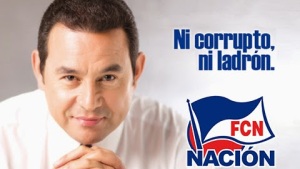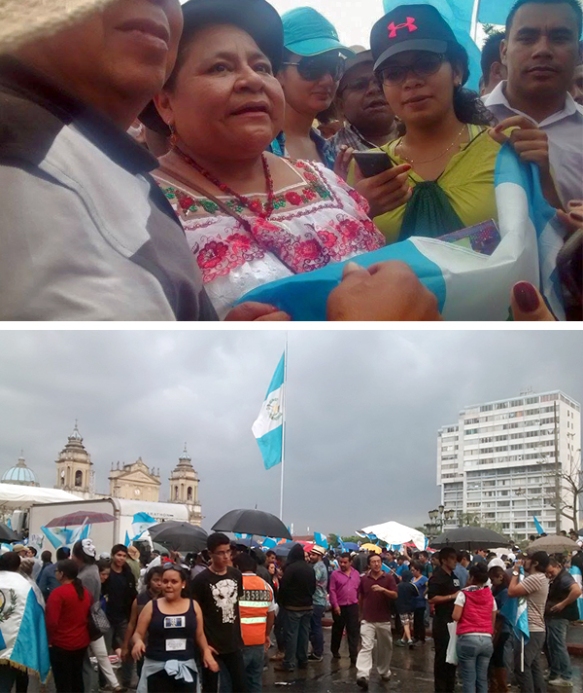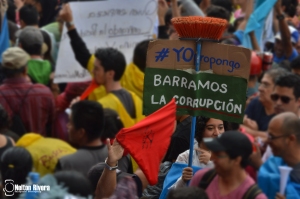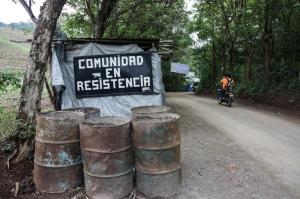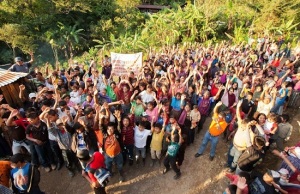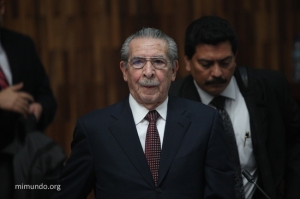Rios Montt Sent for Psychiatric Observation, Delaying the Genocide Trial

Tele Sur TV
Yesterday, ex-Dictator Efrain Rios Montt was placed in a psychiatric hospital for observation by the Guatemalan Court overseeing his retrial for genocide. The court said its ruling was to protect Rios Montt’s health, and was also requested by the Public Ministry, after the defense found him incompetent to stand trial. It has been reported that Rios Montt will be in observation for nine days, delaying his retrial once again.
Senate Published Draft Budget
On Thursday, July 9, the Senate passed a foreign assistance budget allocating $675 million for Central America, with $142 million designated specifically for Guatemala. The bill contains important restrictions, conditions and reporting requirements for Guatemala – including restrictions on funds to the Guatemalan Army. Conditioning US funds based on compliance with human rights investigations and accountability is one thing GHRC and our partners advocate for every year as a tool to leverage positive change in Guatemala, and we were pleased to see many of our recommendations including in the Senate Bill.
Victory for La Puya: Guatemalan Court Orders Suspension of Construction Operations at the El Tambor Mine
GHRC applauds the July 15 resolution by a Guatemalan appeals court which ruled in favor of the right of residents to be consulted about projects that affect them and ordered the suspension of construction activities at the mine.
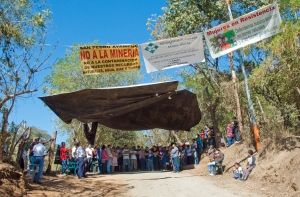
The court found the company was operating illegally, “without permit, authorization or approval from the Municipality of San Pedro Ayampuc…to carry out its mining project” and that the responsibility falls to the Municipal Council to enforce the law. GHRC has called on the US Embassy to encourage the company to comply with the verdict, and suspend all construction activities at its mine site until a community consultation is held.
Further recognition of the work of land rights activists continues with the comprehensive account published by Jeff Abbott of Vice News of the country’s unified effort to end corruption within the current political crisis of Guatemala, and describes the role of indigenous communities in current social movements, including resistance efforts against mining and hydroelectric projects.
Judge Confirms Soldiers will be charged not with extrajudicial execution, but with murder in self-defense, for 2012 killing of indigenous protesters
On October 4, 2012, approximately 15,000 members of the indigenous communities in Totonicapán, Guatemala gathered to block five key transit points on the Pan-American Highway to protest the excessive electricity prices, changes to the professional teacher training requirements, and proposed constitutional reforms. A military contingent of 89 soldiers confronted the protestors. As a result, six protesters were killed, 40 were wounded by the military, and one of the protesters was disappeared during the confrontation. The Totonicapán massacre was the first by the military since the war.
After years of delays, a judge, Carol Patricia Flores has confirmed that the nine soldiers involved will be charged of murder in self-defense (“en estado de emocion violenta), rather than for extrajudicial execution. Flores herself faces allegations put forward by the CICIG and Public Ministry of illicit enrichment and money laundering. The Supreme Court will soon decide if Flores should face criminal investigation.
Criminal Charges Filed against former Minister of Energy and Mines
On July 12, 2015, the Guatemalan Center for Environmental and Social Legal Action (CALAS) filed criminal charges against former Minister of Energy and Mines (MEM), Erick Archila, and former Mines Director at MEM, Fernando Castellanos. Archila and Castellanos are accused of violating the Constitution and for breach of duty, as they granted Tahoe Resources an exploitation license without adequate consideration of more than 250 community complaints against the project. CALAS called on the CICIG to fully investigate the Escobal licensing process, citing Archila’s possible involvement in influence trafficking and illicit enrichment.
UN Report Concludes that Criminal Organizations Fund 25% of the Country’s Politics
A recent report conducted by the UN’s CICIG demonstrated that a quarter of the money supplied for the cost of Guatemalan politics comes from criminal organizations, primarily drug traffickers. The report released on Thursday also stated that dishonest money and corruption financially fuel the political system of the country. “Corruption is the unifying element of the Guatemalan political system based on an amalgam of interests that include politicians, officials, public entities, businessmen, non-governmental organizations and criminal groups,” said CICIG Commissioner Ivan Velasquez.
In fact, on July 15, the Vice Presidential candidate for the Lider Party, currently leading polls, was accused of corruption, specifically of illicit association and influence trafficking. Authorities allege that Edgar Barquin was a part of a criminal network led by businessman Francisco Morales to create ghost companies in order to channel over $120 million to China, the US, Colombia, and others countries.
Meanwhile, Guatemala’s electoral court ruled that Zury Rios Sosa, the daughter of former dictator Efrain Rios Montt, could not run for president, a decision quickly overruled by the Supreme Court. Former president Portillo, 2000-2004, was also denied his candidacy for congress. Portillo recently returned to Guatemala after serving a 70-month sentence in US prison for laundering money from the Taiwanese government during his administration.
Public attention is more focused on the multitude of corruption scandals than on the upcoming elections; the OAS, however, has announced it will send a mission to monitor the process.
“Supreme Court on the Side of the Guatemalan People”
The Guatemalan Supreme Court has ruled to allow a congressional probe into corruption allegations against President Perez Molina to continue. If his immunity is withdrawn, he could face charges before his term ends in January 2014.

